Management & Organisations in Global Environment: An Essay
VerifiedAdded on 2023/06/12
|6
|1550
|418
Essay
AI Summary
This essay delves into the concepts of management and organisations within a global environment, drawing upon e-learning resources related to Ford and Taylorism, as well as the definition of culture. It highlights Taylor's strategic management theory and its impact on Ford's production efficiency, emphasizing specialization and cost reduction. The essay further explores the significance of cultural values within an organization, discussing how these values influence employee behavior and overall business operations. The importance of understanding and adapting to diverse cultures in the global market is also discussed, using examples to illustrate the potential consequences of cultural insensitivity. The essay concludes by reinforcing the importance of Taylor's principles in strategic management and the critical role of cultural values in shaping a company's success.
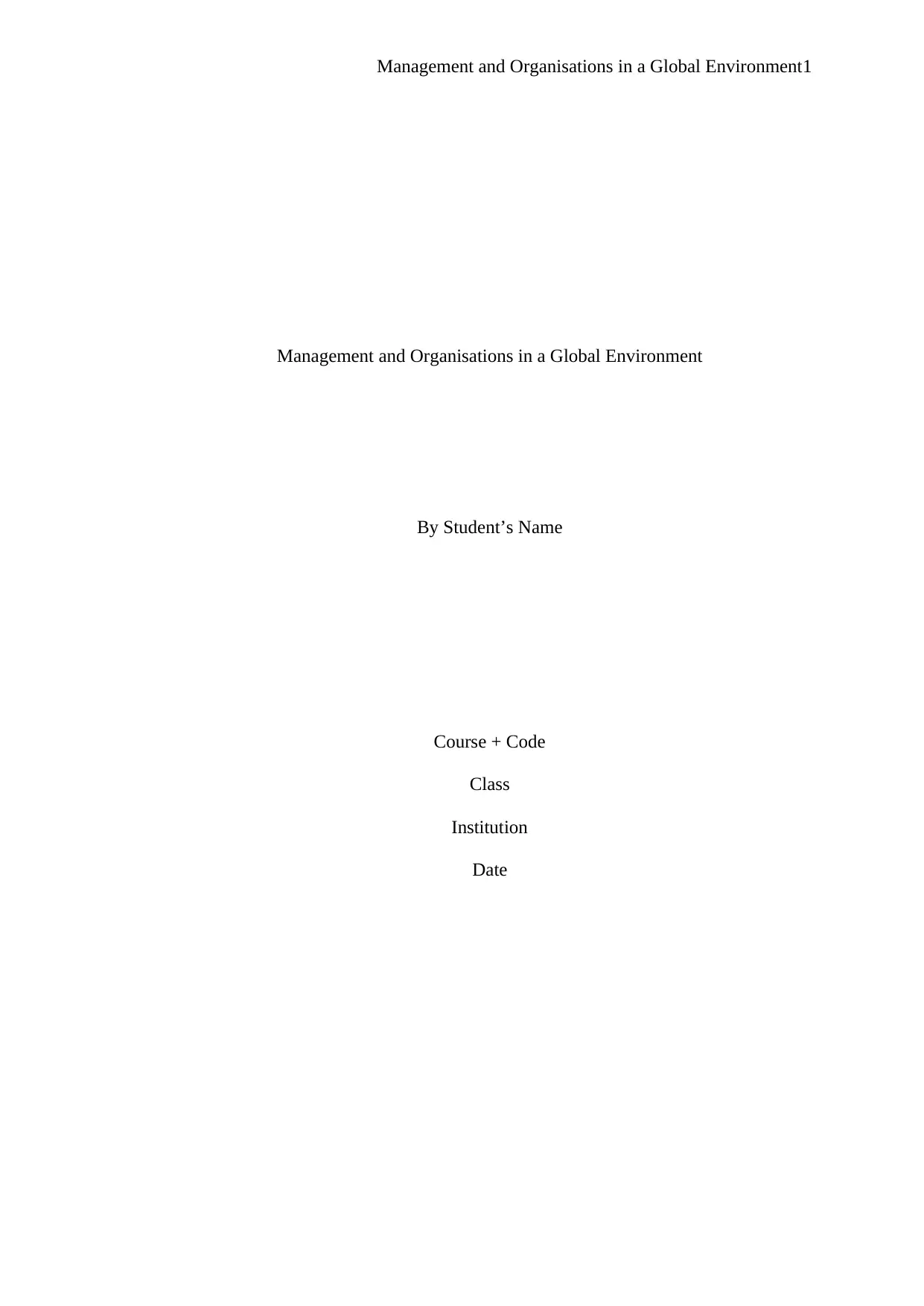
Management and Organisations in a Global Environment1
Management and Organisations in a Global Environment
By Student’s Name
Course + Code
Class
Institution
Date
Management and Organisations in a Global Environment
By Student’s Name
Course + Code
Class
Institution
Date
Paraphrase This Document
Need a fresh take? Get an instant paraphrase of this document with our AI Paraphraser
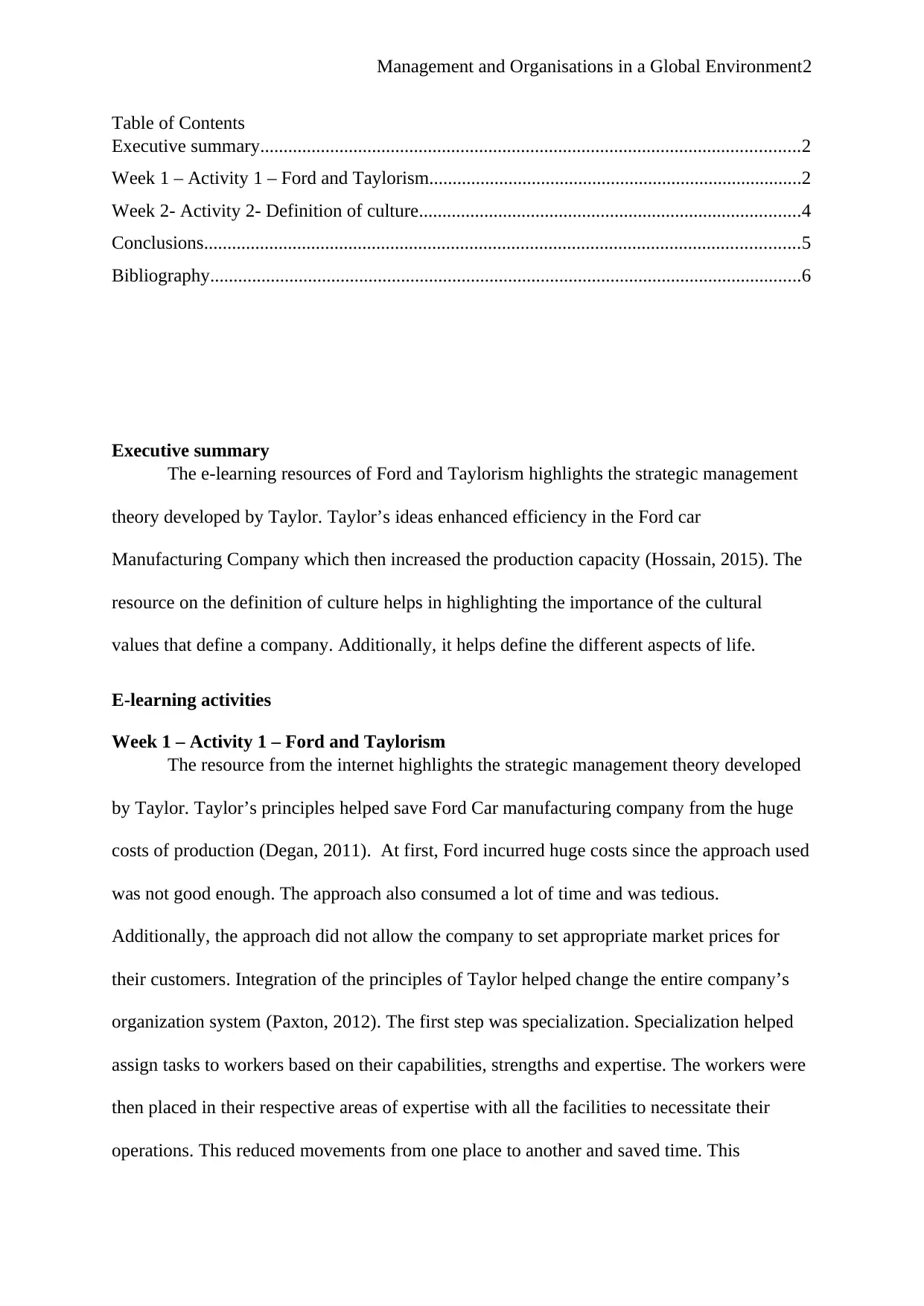
Management and Organisations in a Global Environment2
Table of Contents
Executive summary....................................................................................................................2
Week 1 – Activity 1 – Ford and Taylorism................................................................................2
Week 2- Activity 2- Definition of culture..................................................................................4
Conclusions................................................................................................................................5
Bibliography...............................................................................................................................6
Executive summary
The e-learning resources of Ford and Taylorism highlights the strategic management
theory developed by Taylor. Taylor’s ideas enhanced efficiency in the Ford car
Manufacturing Company which then increased the production capacity (Hossain, 2015). The
resource on the definition of culture helps in highlighting the importance of the cultural
values that define a company. Additionally, it helps define the different aspects of life.
E-learning activities
Week 1 – Activity 1 – Ford and Taylorism
The resource from the internet highlights the strategic management theory developed
by Taylor. Taylor’s principles helped save Ford Car manufacturing company from the huge
costs of production (Degan, 2011). At first, Ford incurred huge costs since the approach used
was not good enough. The approach also consumed a lot of time and was tedious.
Additionally, the approach did not allow the company to set appropriate market prices for
their customers. Integration of the principles of Taylor helped change the entire company’s
organization system (Paxton, 2012). The first step was specialization. Specialization helped
assign tasks to workers based on their capabilities, strengths and expertise. The workers were
then placed in their respective areas of expertise with all the facilities to necessitate their
operations. This reduced movements from one place to another and saved time. This
Table of Contents
Executive summary....................................................................................................................2
Week 1 – Activity 1 – Ford and Taylorism................................................................................2
Week 2- Activity 2- Definition of culture..................................................................................4
Conclusions................................................................................................................................5
Bibliography...............................................................................................................................6
Executive summary
The e-learning resources of Ford and Taylorism highlights the strategic management
theory developed by Taylor. Taylor’s ideas enhanced efficiency in the Ford car
Manufacturing Company which then increased the production capacity (Hossain, 2015). The
resource on the definition of culture helps in highlighting the importance of the cultural
values that define a company. Additionally, it helps define the different aspects of life.
E-learning activities
Week 1 – Activity 1 – Ford and Taylorism
The resource from the internet highlights the strategic management theory developed
by Taylor. Taylor’s principles helped save Ford Car manufacturing company from the huge
costs of production (Degan, 2011). At first, Ford incurred huge costs since the approach used
was not good enough. The approach also consumed a lot of time and was tedious.
Additionally, the approach did not allow the company to set appropriate market prices for
their customers. Integration of the principles of Taylor helped change the entire company’s
organization system (Paxton, 2012). The first step was specialization. Specialization helped
assign tasks to workers based on their capabilities, strengths and expertise. The workers were
then placed in their respective areas of expertise with all the facilities to necessitate their
operations. This reduced movements from one place to another and saved time. This
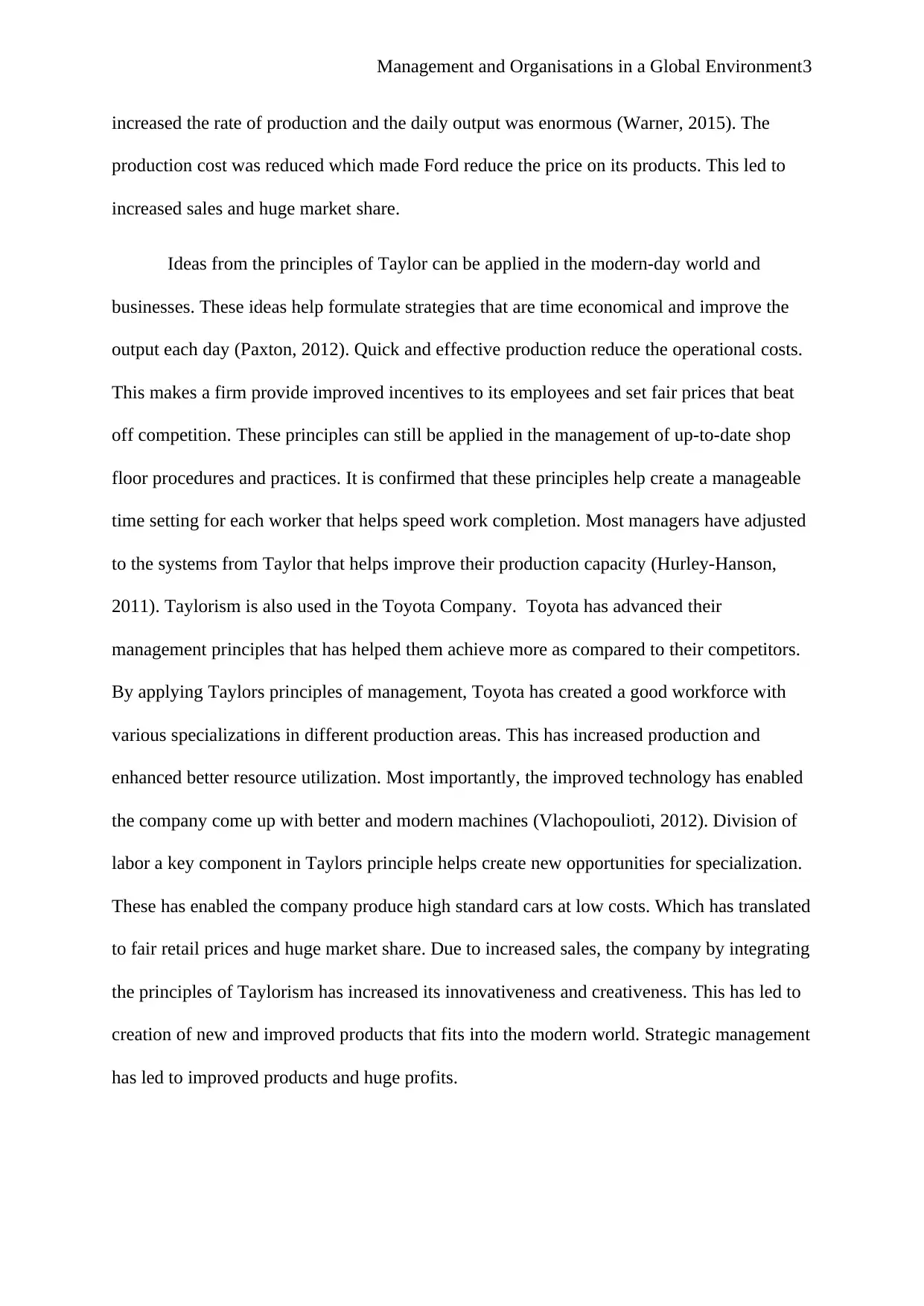
Management and Organisations in a Global Environment3
increased the rate of production and the daily output was enormous (Warner, 2015). The
production cost was reduced which made Ford reduce the price on its products. This led to
increased sales and huge market share.
Ideas from the principles of Taylor can be applied in the modern-day world and
businesses. These ideas help formulate strategies that are time economical and improve the
output each day (Paxton, 2012). Quick and effective production reduce the operational costs.
This makes a firm provide improved incentives to its employees and set fair prices that beat
off competition. These principles can still be applied in the management of up-to-date shop
floor procedures and practices. It is confirmed that these principles help create a manageable
time setting for each worker that helps speed work completion. Most managers have adjusted
to the systems from Taylor that helps improve their production capacity (Hurley-Hanson,
2011). Taylorism is also used in the Toyota Company. Toyota has advanced their
management principles that has helped them achieve more as compared to their competitors.
By applying Taylors principles of management, Toyota has created a good workforce with
various specializations in different production areas. This has increased production and
enhanced better resource utilization. Most importantly, the improved technology has enabled
the company come up with better and modern machines (Vlachopoulioti, 2012). Division of
labor a key component in Taylors principle helps create new opportunities for specialization.
These has enabled the company produce high standard cars at low costs. Which has translated
to fair retail prices and huge market share. Due to increased sales, the company by integrating
the principles of Taylorism has increased its innovativeness and creativeness. This has led to
creation of new and improved products that fits into the modern world. Strategic management
has led to improved products and huge profits.
increased the rate of production and the daily output was enormous (Warner, 2015). The
production cost was reduced which made Ford reduce the price on its products. This led to
increased sales and huge market share.
Ideas from the principles of Taylor can be applied in the modern-day world and
businesses. These ideas help formulate strategies that are time economical and improve the
output each day (Paxton, 2012). Quick and effective production reduce the operational costs.
This makes a firm provide improved incentives to its employees and set fair prices that beat
off competition. These principles can still be applied in the management of up-to-date shop
floor procedures and practices. It is confirmed that these principles help create a manageable
time setting for each worker that helps speed work completion. Most managers have adjusted
to the systems from Taylor that helps improve their production capacity (Hurley-Hanson,
2011). Taylorism is also used in the Toyota Company. Toyota has advanced their
management principles that has helped them achieve more as compared to their competitors.
By applying Taylors principles of management, Toyota has created a good workforce with
various specializations in different production areas. This has increased production and
enhanced better resource utilization. Most importantly, the improved technology has enabled
the company come up with better and modern machines (Vlachopoulioti, 2012). Division of
labor a key component in Taylors principle helps create new opportunities for specialization.
These has enabled the company produce high standard cars at low costs. Which has translated
to fair retail prices and huge market share. Due to increased sales, the company by integrating
the principles of Taylorism has increased its innovativeness and creativeness. This has led to
creation of new and improved products that fits into the modern world. Strategic management
has led to improved products and huge profits.
⊘ This is a preview!⊘
Do you want full access?
Subscribe today to unlock all pages.

Trusted by 1+ million students worldwide
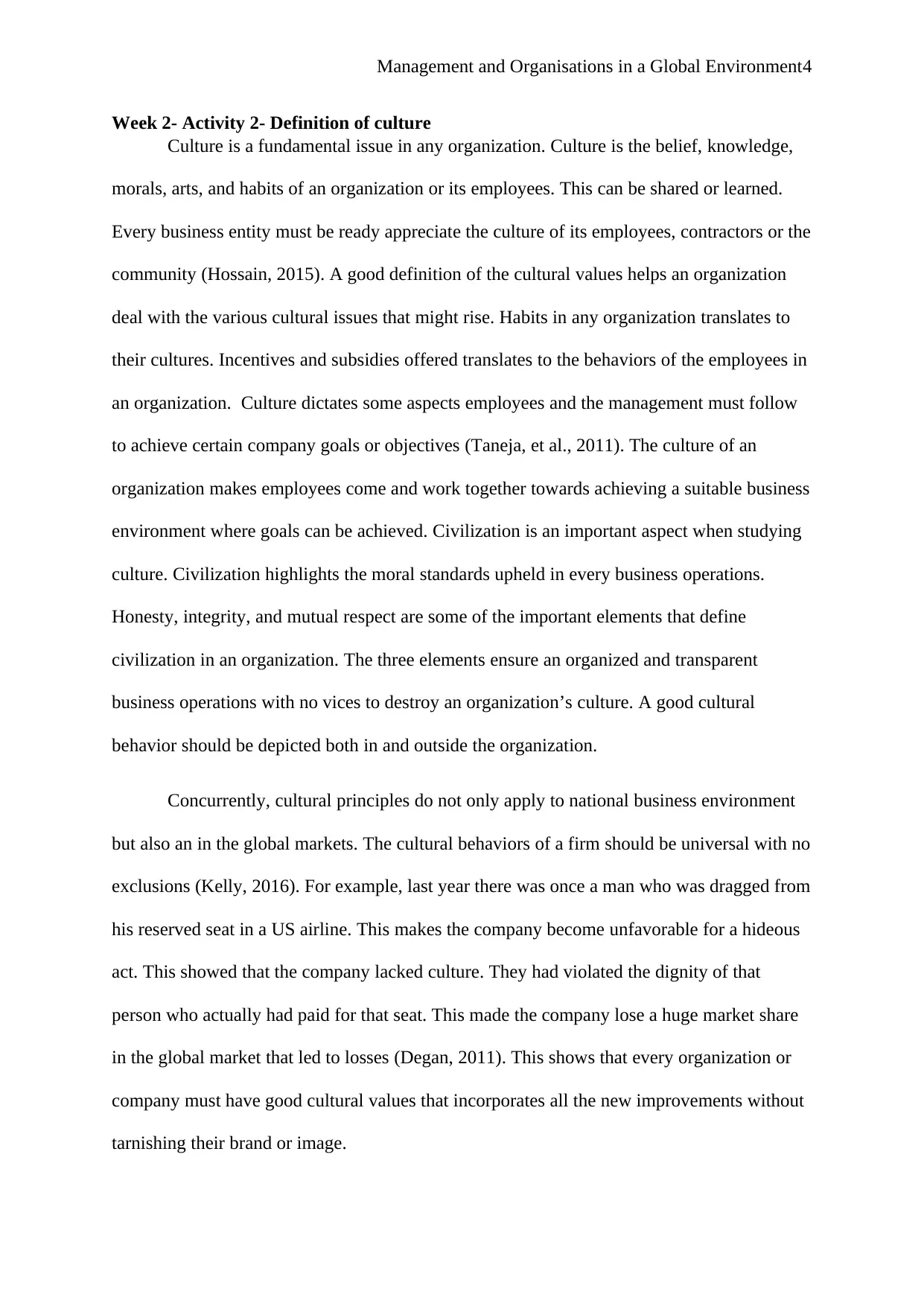
Management and Organisations in a Global Environment4
Week 2- Activity 2- Definition of culture
Culture is a fundamental issue in any organization. Culture is the belief, knowledge,
morals, arts, and habits of an organization or its employees. This can be shared or learned.
Every business entity must be ready appreciate the culture of its employees, contractors or the
community (Hossain, 2015). A good definition of the cultural values helps an organization
deal with the various cultural issues that might rise. Habits in any organization translates to
their cultures. Incentives and subsidies offered translates to the behaviors of the employees in
an organization. Culture dictates some aspects employees and the management must follow
to achieve certain company goals or objectives (Taneja, et al., 2011). The culture of an
organization makes employees come and work together towards achieving a suitable business
environment where goals can be achieved. Civilization is an important aspect when studying
culture. Civilization highlights the moral standards upheld in every business operations.
Honesty, integrity, and mutual respect are some of the important elements that define
civilization in an organization. The three elements ensure an organized and transparent
business operations with no vices to destroy an organization’s culture. A good cultural
behavior should be depicted both in and outside the organization.
Concurrently, cultural principles do not only apply to national business environment
but also an in the global markets. The cultural behaviors of a firm should be universal with no
exclusions (Kelly, 2016). For example, last year there was once a man who was dragged from
his reserved seat in a US airline. This makes the company become unfavorable for a hideous
act. This showed that the company lacked culture. They had violated the dignity of that
person who actually had paid for that seat. This made the company lose a huge market share
in the global market that led to losses (Degan, 2011). This shows that every organization or
company must have good cultural values that incorporates all the new improvements without
tarnishing their brand or image.
Week 2- Activity 2- Definition of culture
Culture is a fundamental issue in any organization. Culture is the belief, knowledge,
morals, arts, and habits of an organization or its employees. This can be shared or learned.
Every business entity must be ready appreciate the culture of its employees, contractors or the
community (Hossain, 2015). A good definition of the cultural values helps an organization
deal with the various cultural issues that might rise. Habits in any organization translates to
their cultures. Incentives and subsidies offered translates to the behaviors of the employees in
an organization. Culture dictates some aspects employees and the management must follow
to achieve certain company goals or objectives (Taneja, et al., 2011). The culture of an
organization makes employees come and work together towards achieving a suitable business
environment where goals can be achieved. Civilization is an important aspect when studying
culture. Civilization highlights the moral standards upheld in every business operations.
Honesty, integrity, and mutual respect are some of the important elements that define
civilization in an organization. The three elements ensure an organized and transparent
business operations with no vices to destroy an organization’s culture. A good cultural
behavior should be depicted both in and outside the organization.
Concurrently, cultural principles do not only apply to national business environment
but also an in the global markets. The cultural behaviors of a firm should be universal with no
exclusions (Kelly, 2016). For example, last year there was once a man who was dragged from
his reserved seat in a US airline. This makes the company become unfavorable for a hideous
act. This showed that the company lacked culture. They had violated the dignity of that
person who actually had paid for that seat. This made the company lose a huge market share
in the global market that led to losses (Degan, 2011). This shows that every organization or
company must have good cultural values that incorporates all the new improvements without
tarnishing their brand or image.
Paraphrase This Document
Need a fresh take? Get an instant paraphrase of this document with our AI Paraphraser
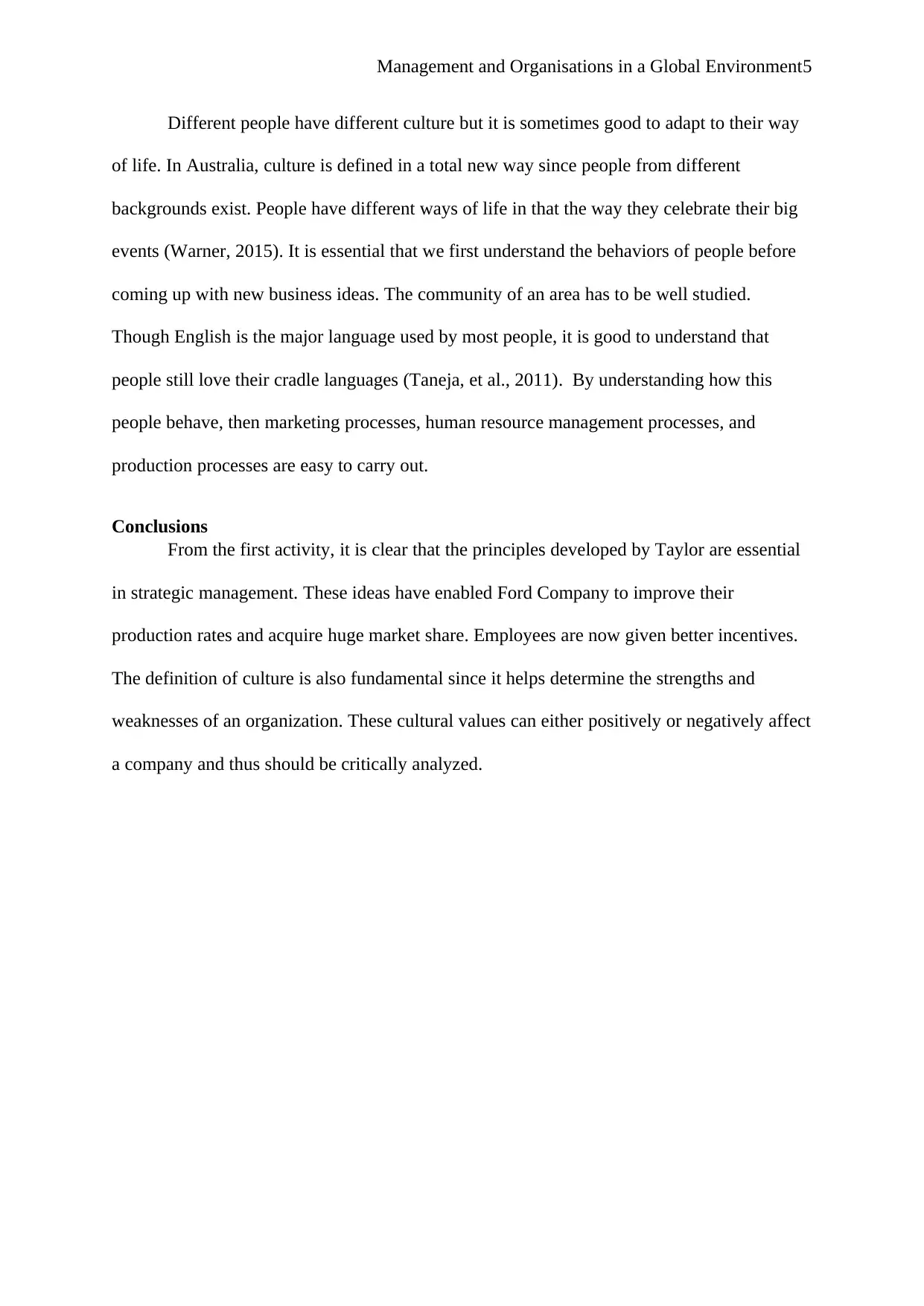
Management and Organisations in a Global Environment5
Different people have different culture but it is sometimes good to adapt to their way
of life. In Australia, culture is defined in a total new way since people from different
backgrounds exist. People have different ways of life in that the way they celebrate their big
events (Warner, 2015). It is essential that we first understand the behaviors of people before
coming up with new business ideas. The community of an area has to be well studied.
Though English is the major language used by most people, it is good to understand that
people still love their cradle languages (Taneja, et al., 2011). By understanding how this
people behave, then marketing processes, human resource management processes, and
production processes are easy to carry out.
Conclusions
From the first activity, it is clear that the principles developed by Taylor are essential
in strategic management. These ideas have enabled Ford Company to improve their
production rates and acquire huge market share. Employees are now given better incentives.
The definition of culture is also fundamental since it helps determine the strengths and
weaknesses of an organization. These cultural values can either positively or negatively affect
a company and thus should be critically analyzed.
Different people have different culture but it is sometimes good to adapt to their way
of life. In Australia, culture is defined in a total new way since people from different
backgrounds exist. People have different ways of life in that the way they celebrate their big
events (Warner, 2015). It is essential that we first understand the behaviors of people before
coming up with new business ideas. The community of an area has to be well studied.
Though English is the major language used by most people, it is good to understand that
people still love their cradle languages (Taneja, et al., 2011). By understanding how this
people behave, then marketing processes, human resource management processes, and
production processes are easy to carry out.
Conclusions
From the first activity, it is clear that the principles developed by Taylor are essential
in strategic management. These ideas have enabled Ford Company to improve their
production rates and acquire huge market share. Employees are now given better incentives.
The definition of culture is also fundamental since it helps determine the strengths and
weaknesses of an organization. These cultural values can either positively or negatively affect
a company and thus should be critically analyzed.
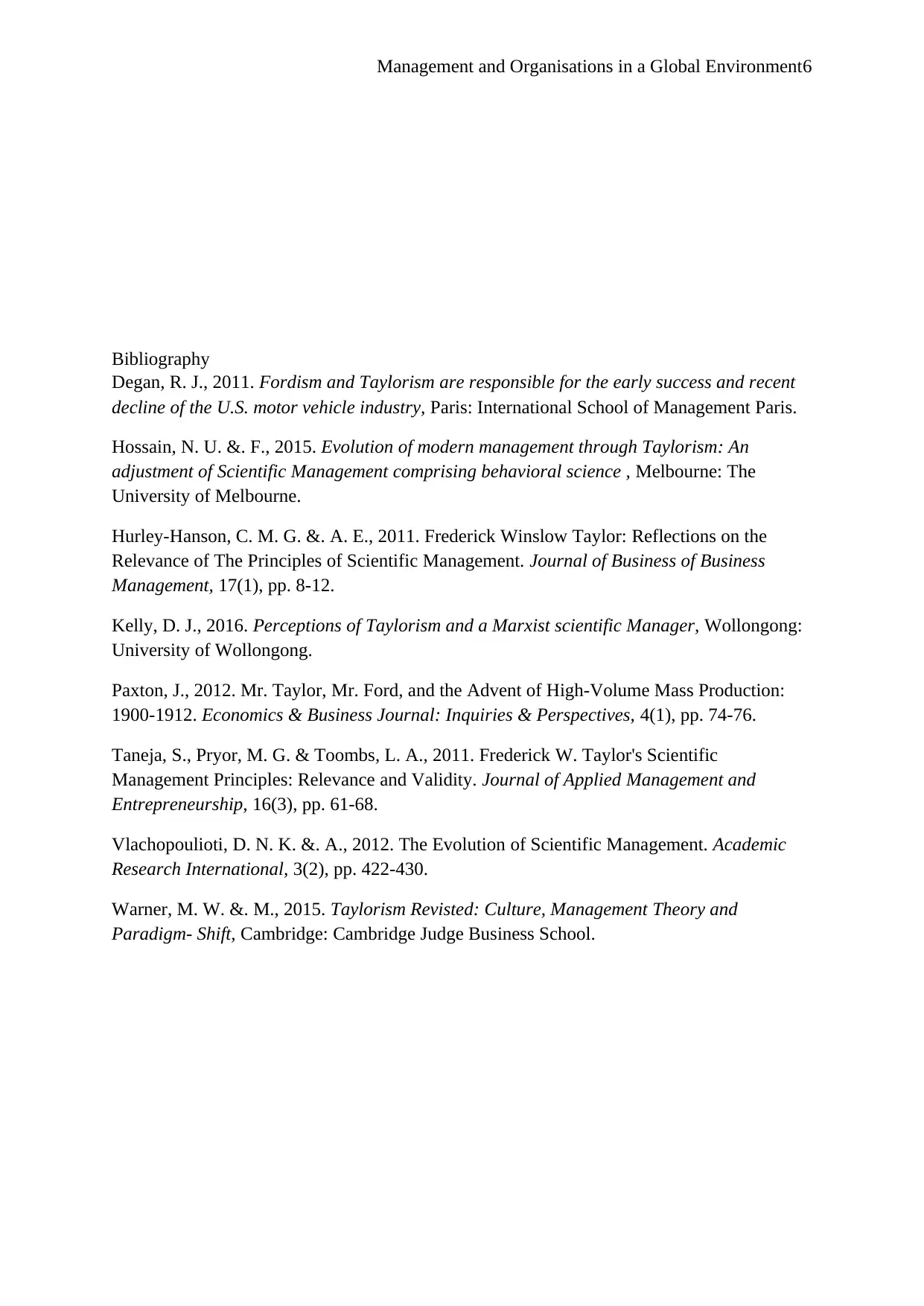
Management and Organisations in a Global Environment6
Bibliography
Degan, R. J., 2011. Fordism and Taylorism are responsible for the early success and recent
decline of the U.S. motor vehicle industry, Paris: International School of Management Paris.
Hossain, N. U. &. F., 2015. Evolution of modern management through Taylorism: An
adjustment of Scientific Management comprising behavioral science , Melbourne: The
University of Melbourne.
Hurley-Hanson, C. M. G. &. A. E., 2011. Frederick Winslow Taylor: Reflections on the
Relevance of The Principles of Scientific Management. Journal of Business of Business
Management, 17(1), pp. 8-12.
Kelly, D. J., 2016. Perceptions of Taylorism and a Marxist scientific Manager, Wollongong:
University of Wollongong.
Paxton, J., 2012. Mr. Taylor, Mr. Ford, and the Advent of High-Volume Mass Production:
1900-1912. Economics & Business Journal: Inquiries & Perspectives, 4(1), pp. 74-76.
Taneja, S., Pryor, M. G. & Toombs, L. A., 2011. Frederick W. Taylor's Scientific
Management Principles: Relevance and Validity. Journal of Applied Management and
Entrepreneurship, 16(3), pp. 61-68.
Vlachopoulioti, D. N. K. &. A., 2012. The Evolution of Scientific Management. Academic
Research International, 3(2), pp. 422-430.
Warner, M. W. &. M., 2015. Taylorism Revisted: Culture, Management Theory and
Paradigm- Shift, Cambridge: Cambridge Judge Business School.
Bibliography
Degan, R. J., 2011. Fordism and Taylorism are responsible for the early success and recent
decline of the U.S. motor vehicle industry, Paris: International School of Management Paris.
Hossain, N. U. &. F., 2015. Evolution of modern management through Taylorism: An
adjustment of Scientific Management comprising behavioral science , Melbourne: The
University of Melbourne.
Hurley-Hanson, C. M. G. &. A. E., 2011. Frederick Winslow Taylor: Reflections on the
Relevance of The Principles of Scientific Management. Journal of Business of Business
Management, 17(1), pp. 8-12.
Kelly, D. J., 2016. Perceptions of Taylorism and a Marxist scientific Manager, Wollongong:
University of Wollongong.
Paxton, J., 2012. Mr. Taylor, Mr. Ford, and the Advent of High-Volume Mass Production:
1900-1912. Economics & Business Journal: Inquiries & Perspectives, 4(1), pp. 74-76.
Taneja, S., Pryor, M. G. & Toombs, L. A., 2011. Frederick W. Taylor's Scientific
Management Principles: Relevance and Validity. Journal of Applied Management and
Entrepreneurship, 16(3), pp. 61-68.
Vlachopoulioti, D. N. K. &. A., 2012. The Evolution of Scientific Management. Academic
Research International, 3(2), pp. 422-430.
Warner, M. W. &. M., 2015. Taylorism Revisted: Culture, Management Theory and
Paradigm- Shift, Cambridge: Cambridge Judge Business School.
⊘ This is a preview!⊘
Do you want full access?
Subscribe today to unlock all pages.

Trusted by 1+ million students worldwide
1 out of 6
Related Documents
Your All-in-One AI-Powered Toolkit for Academic Success.
+13062052269
info@desklib.com
Available 24*7 on WhatsApp / Email
![[object Object]](/_next/static/media/star-bottom.7253800d.svg)
Unlock your academic potential
Copyright © 2020–2026 A2Z Services. All Rights Reserved. Developed and managed by ZUCOL.



